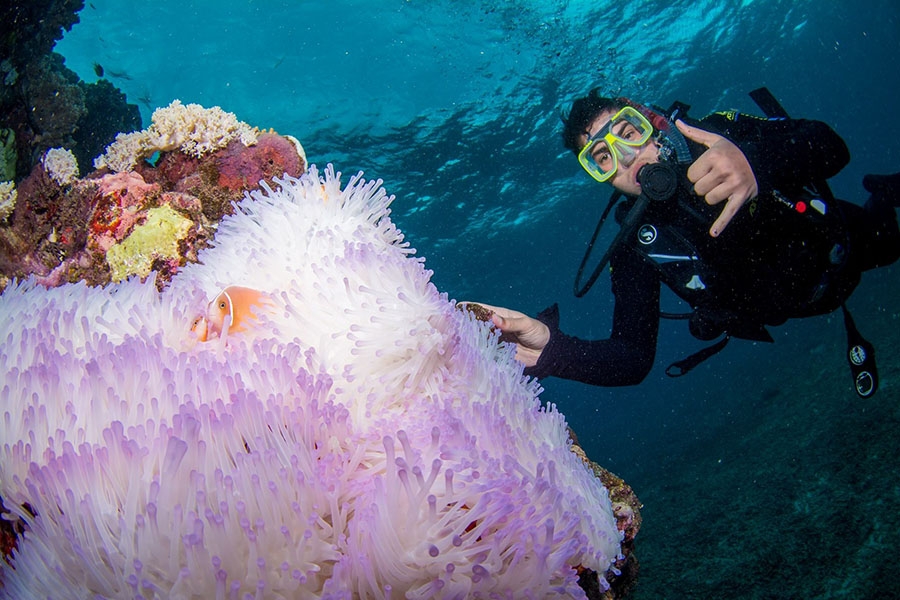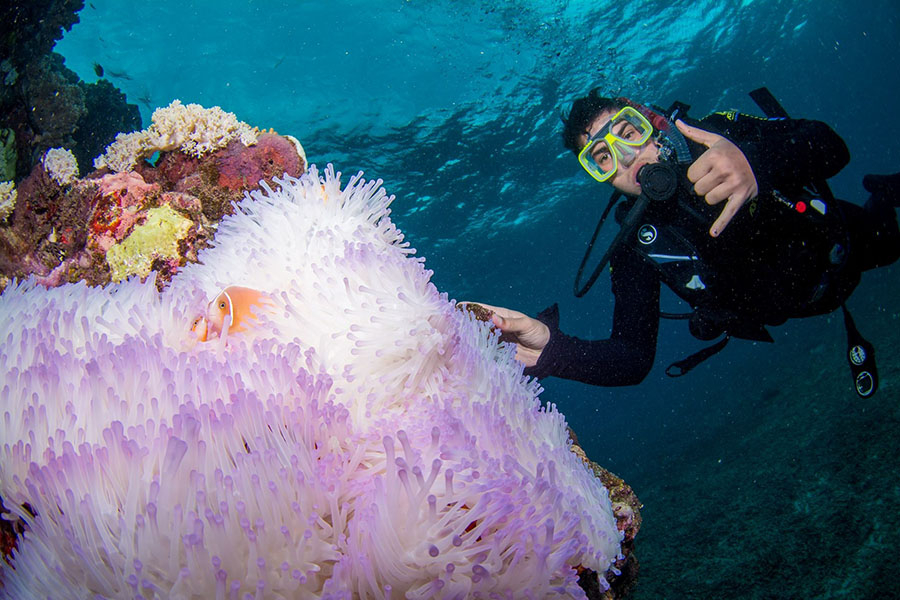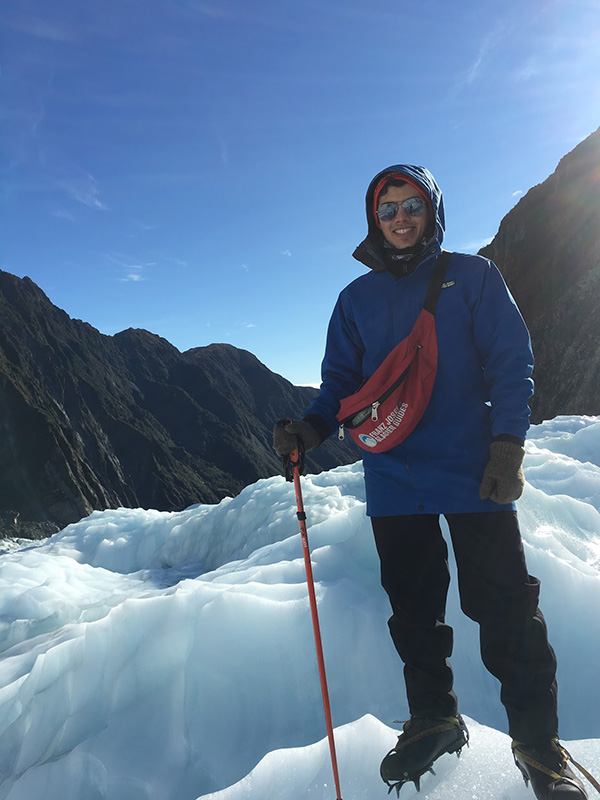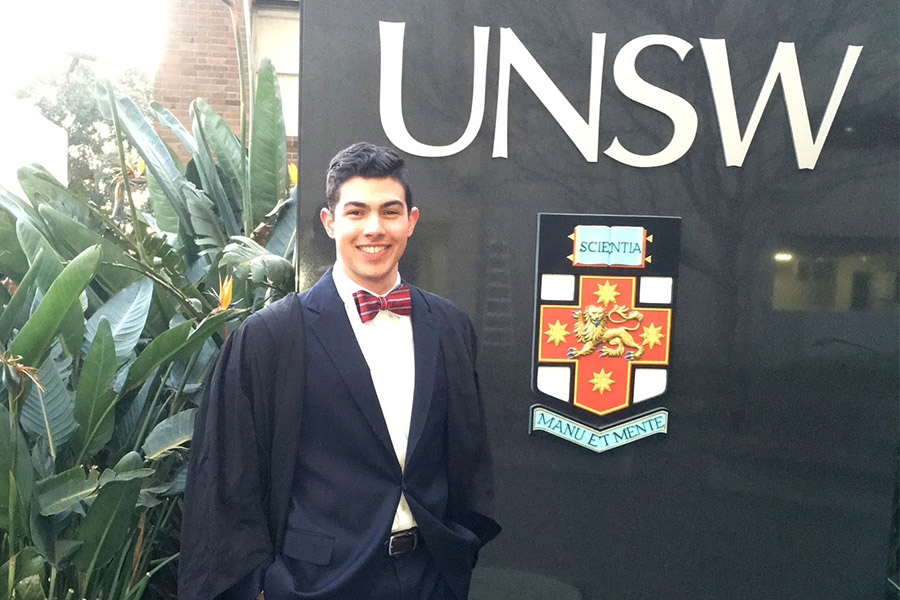
 Civil engineering undergrad Andrew Melissas diving at the Great Barrier Reef during his semester studying abroad in Australia. (Photo Courtesy: Andrew Melissas) |
Civil engineering undergraduate Andrew Melissas spent his spring semester studying at the University of New South Wales in Sydney, Australia, with support from the Joe S. Mundy Global Learning Endowment. He calls that time “the best four months of my life.”
The semester included trips throughout the region — Fiji, New Zealand, the Great Barrier Reef, among them. It also changed Melissas plans for his career, as he notes below.
This is part of an ongoing series of essays from across the globe written by civil and environmental engineering students who have traveled abroad with the support of the Mundy fund.
I decided to study abroad in the hopes that I could share my Greek culture and in turn learn more about the culture of Australia and the Aboriginal culture. No sooner had I arrived in Sydney than an opportunity to experience the latter presented itself.
At the official welcome ceremony for international students at the University of New South Wales, a group of Aborigines of the Cadigal tribe performed a traditional welcome dance. Immediately afterward, the dancers asked for volunteers to come onstage and join them to learn a dance that honored the native birds of the region. Of course I volunteered:
One of the customs that made an impression on me was how every public speaker opened his or her speech by recognizing the ancestors upon whose land we had gathered in a statement known as the Acknowledgement of Country:
“I would like to acknowledge the Cadigal people who are the traditional custodians of this land. I would also like to pay respect to the elders past and present of the Cadigal nation and extend that respect to other Aboriginal people present.”
 Andrew Melissas hikes the Franz Josef Glacier in New Zealand during his spring semester study abroad. (Photo Courtesy: Andrew Melissas) |
I appreciated what was being done, that the Aborigines were being recognized as the traditional owners of the land. However, it did not feel like enough to undo centuries of mistreatment. To be fair, most Australian students I spoke to agreed that the Aborigines had been treated unfairly. It makes me wonder if Americans could or should do a similar Acknowledgement of Country to pay respects to the American Indians of our country.
While we were both once colonies of the British Empire, there are several marked distinctions between American and Australian culture, which I found fascinating. Keep in mind that many Australians are fascinated with America; it is our television shows that are broadcast into their homes and our movies that they pay to go see in the theaters and our music that plays over the radio. Still, the two major differences in the societies were the Tall Poppy Syndrome and the Underdog Mentality, the study abroad department at UNSW informed me.
In stark contrast to rugged American individualism and self-reliance, the Tall Poppy Syndrome exists in Australian culture. Similar to how a plant will be trimmed down if it outgrows its neighbors, it is frowned upon in Australian culture if one’s achievements elevate him or her above their peers. As a result, in my living community I witnessed an absence of the elitism that is present in many American schools. The athletes, the musicians, the artists, the scholastically focused, and the partiers all flowed seamlessly from one group to another. In short, everyone talked to and tolerated everyone else. There was not one single group of “cool kids” who considered themselves better than everyone else.
 Andrew Melissas at the University of New South Wales in Sydney, Australia, where he spent the spring 2016 semester with support from the Joe S. Mundy Global Learning Endowment. (Photo Courtesy: Andrew Melissas) |
The harmonious trend applied to academics as well. Whereas in America, there is a competition to earn the best grades or the best internship or the best research paper, Australians did not seem the least bit interested in competing with one another about grades or any other matter. On the rugby pitch, even after a hard fought match, both sides would make their way to the nearest pub to enjoy the local taps together. No phrase best sums up this attitude than the iconic, “No worries, mate.”
With the Underdog Mentality, there was no swaggering confidence that other cultures attribute to Americans. In place of bravado, there was a willingness to give one’s best, no matter the outcome.
It came as a surprise to me then, that I found I preferred the company of Australians to Americans, even though I am one of the most competitive and confident people I know. Nonetheless, not a day goes by that I do not wish I were back there.
The Mundy Endowment has changed my future goals such that, upon graduation, I plan work in Australia for a few years as a civil engineer. I loved my experience so much that I cannot imagine not going back.
